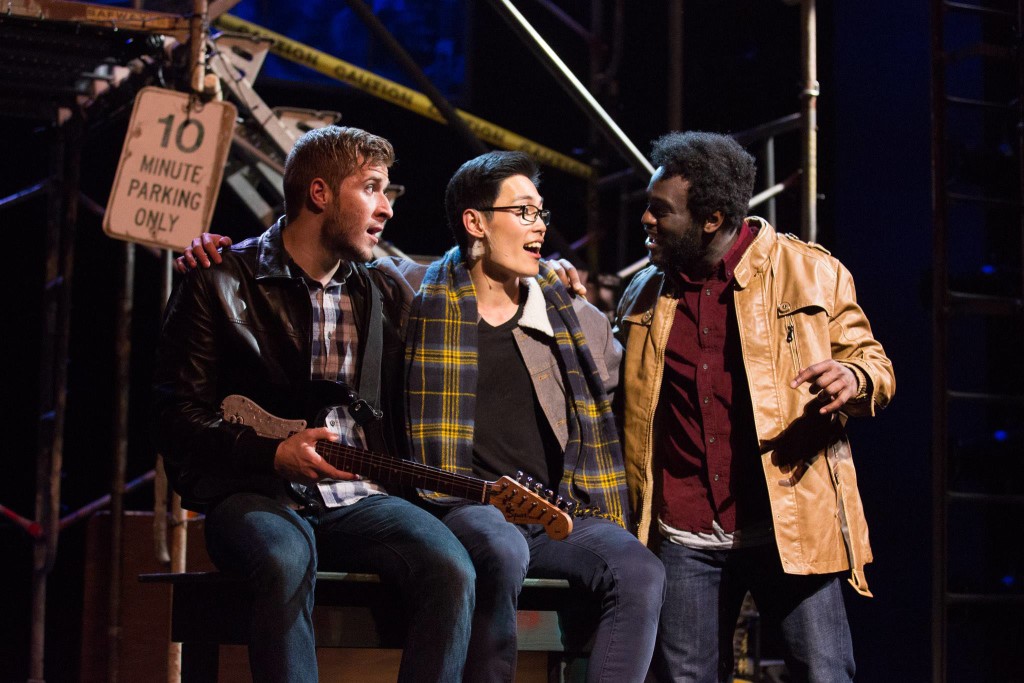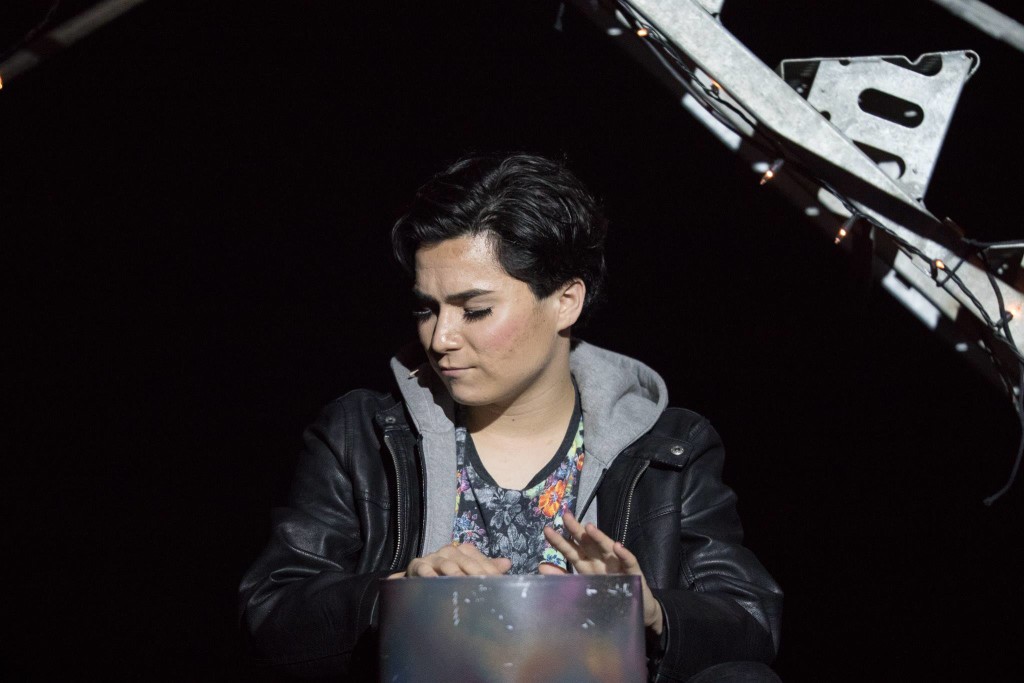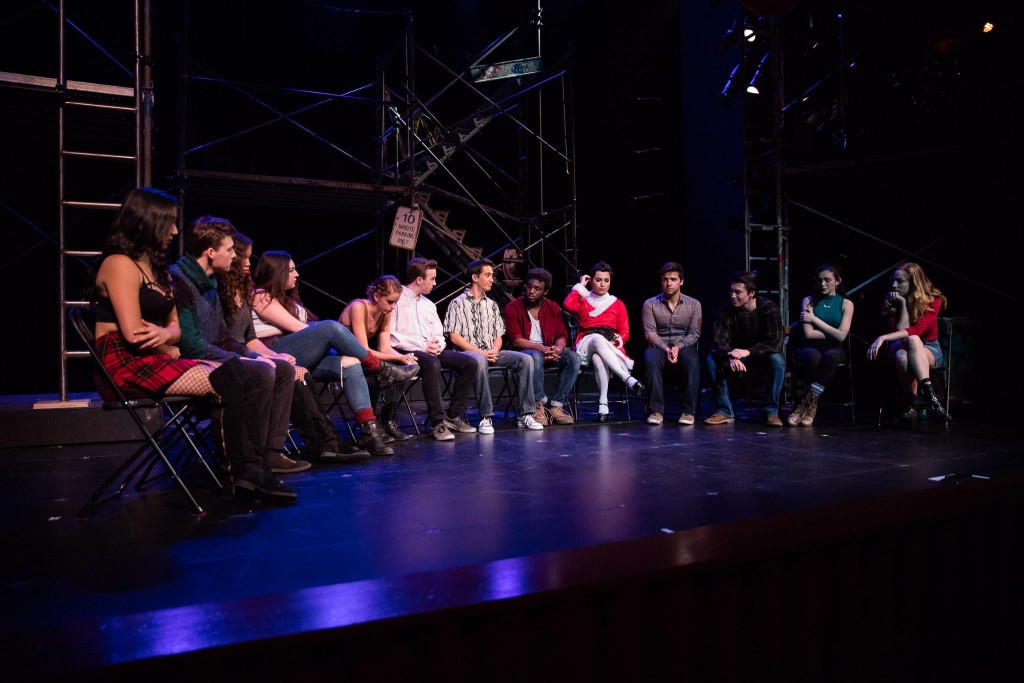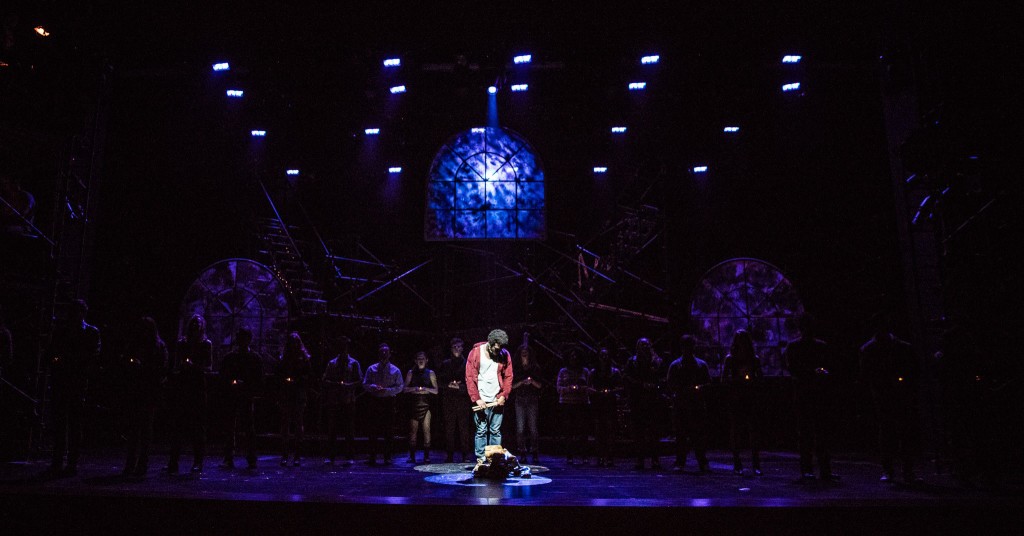
RENT, traditionally, is Mark’s story. The man with the camera bears witness to his six closest friends’ struggles in the midst of the 1990s AIDS epidemic in New York City. He is the one of them to survive, so their stories are really his story of their lives.
In the Ram’s Head production of RENT, it is not until the end of the production that it becomes clear whose story is being told. The strength and authenticity of some performances constantly steal the audience’s hearts and convince them now this is who this play is really about. Angel is one such character. Andrew Savage’s (‘19) performance is everything Angel should be: piercing, warm, and beautiful. From the moment the spotlight finds him playing his bucket drum under the scaffolding set pieces, Savage creates a connection with the audience that is only strengthened through idiosyncratic character moments—stretching and flexing his ankle after the exuberant “Today 4 You” dance, gently keeping the peace between police officers and street coat vendors, and making an entrance to the New Year’s party as the blonde, clear plastic jacket-clad Pussy Galore. As the one closest to death who retains the most joy and generosity, as the one whose drag queen identity is most obvious and socially frowned upon, maybe Angel’s story is the most integral to RENT.

But Angel would be far less elevated if not for the adoration of Collins (Chris Sackes, ‘16), whose vocal performance is one of the most stunning in the show. Their rapid romance is believable and endearing, and the audience bears witness to its blossoming from “Life Support” through “I’ll Cover You” to “I’ll Cover You: Reprise,” the opening of which is the single most powerful moment of this production. Collins stands center stage under lowlights, with the typically neutral or yellow window set pieces changed to a somber but bold blue. Collins’ loyalty and love for his lover and friends—maybe this is the story of RENT.
Most of the other leads have similar developments, where their story, personality, and performance seems the most relatable and meaningful. Mimi (Shelby Mynhier, ‘17) and Mark (Preston Lim, ‘17) are the most difficult to connect to, as Mynhier’s vocals do not match her excellent dancing and physical characterization of Mimi, and Lim’s acting does not match the strength of his vocal performance. But Mimi and Roger’s chemistry adds needed depth to both their stories, and Lim’s believability and emotionality takes a 180 during his “Halloween” solo and through the incredibly sung, incredibly blocked “Living in America,” another of the show’s strongest numbers. Mark and Roger both shift in character and performance strength during this song. It is when Roger finally does something about his stagnant, depressed state, portrayed well by Peter Litzow’s (‘18) slightly tortured repetitive body language and speech patterns. There is no doubt that Roger is stuck, and the audience believes him. After going through what he did, who wouldn’t be?
But RENT does not belong to Roger, or Mimi, or Mark, or Collins or Angel. As much as Maureen (Justine DeSilva, ‘16) would like it to, the show does not belong to her either. DeSilva’s performance is over the top, over the moon, and far above my expectations or imaginations. Her and Joanne’s (Clarissa Carter, ‘19) chemistry is energetic and powerful, qualities that Carter brings to each number she performs in. “Tango: Maureen” and “Take Me or Leave Me” show Carter’s stage presence and commitment to her character, and Mark and Maureen prove to be equally powerful vocal and personality counterbalances.

If RENT doesn’t tell the story of any of the lead characters, whose story does it tell? Not Benny’s, though Victor Ragsdale’s (‘19) impressive vocals and nuanced reactions create a Benny that the audience cannot completely hate. It was through keeping my eye on Paul (Paul Gregg, ‘17), during “Life Support” and as he played a window washer trying to make an “honest living” that I began to realize the story that this particular production of RENT tells. Everyone’s.
Rarely do Stanford musicals have such standout ensembles, but RENT’s small cast means that every single person has a unique narrative and personality, and is needed on that stage to make the production whole. If reviews did not have word limits, I could write a paragraph about each ensemble member’s performance strengths, weaknesses, contributions, and nuances that make this production so powerful. Highlights include Abigail Flowers’ “Seasons of Love” solo, Jessica Fry’s dancing diversity as both stripper and cow, and Zoë Sonnenberg’s Jewish-mother voicemails. Though it is a musical, RENT is not a spectacle. Above all, it has depth. The actors have depth (it is amazing that the same group of people perform “Will I?” “Christmas Bells” and “Contact”). The stage has depth, as window pieces and the New York skyline fly in and out behind the massive scaffolding set pieces that move automatically (see interjections in my performance notes: “MOVING PLATFORMS”, “They move!!”, “These platforms are moving on their own…”).

The platforms, an unbelievable feat of Michael Tucker, are one of the ways that the depth of this show translates to the audience. Not only is the ensemble strong and individualized, but the audience senses the production efforts that normally stay behind the scenes in a rare and raw way. The design and labor that went into the platforms is evident, the band and vocal director perform, visibly and from high heights, in scaffolding on the sides of the stage, the costuming is bursting with personality (shoutout to the GIRL POWER crop top that Isaac Goldstein wears in “Over the Moon”), and the lighting is powerful and varied, from the low-level backlighting that starts “Seasons of Love” to the blue spot that ends “I’ll Cover You: Reprise.” The choreography provides some of the most creative and original moments of the show, like the casts’ bouncing that simulates a subway ride during “Santa Fe.” Even the props have character-you will not want to miss the budding relationship between Maureen and a bag of potato chips.
 RENT, and this production in particular, is quite different from most musicals. Rather than cleanliness, seamlessness, and spectacle, RENT is about personality, emotion, and perseverance. Director Liz Knarr (‘16) brings this to the stage by encouraging the cast to stand out and commit to a range of characterizations, and by exposing the raw talents and passions of the talented staff, who, even without stagetime, make their presence known. On a massive stage, it is difficult to foster intimacy. But the audience of RENT will see something with so much depth that they will experience not only the stories of everyone, characters or real people, involved in this production, but will also experience the stories of Alphabet City, New York, 1994, of isolation and death, of friendship and love, and of themselves.
RENT, and this production in particular, is quite different from most musicals. Rather than cleanliness, seamlessness, and spectacle, RENT is about personality, emotion, and perseverance. Director Liz Knarr (‘16) brings this to the stage by encouraging the cast to stand out and commit to a range of characterizations, and by exposing the raw talents and passions of the talented staff, who, even without stagetime, make their presence known. On a massive stage, it is difficult to foster intimacy. But the audience of RENT will see something with so much depth that they will experience not only the stories of everyone, characters or real people, involved in this production, but will also experience the stories of Alphabet City, New York, 1994, of isolation and death, of friendship and love, and of themselves.
Photos courtesy of Frank Chen
